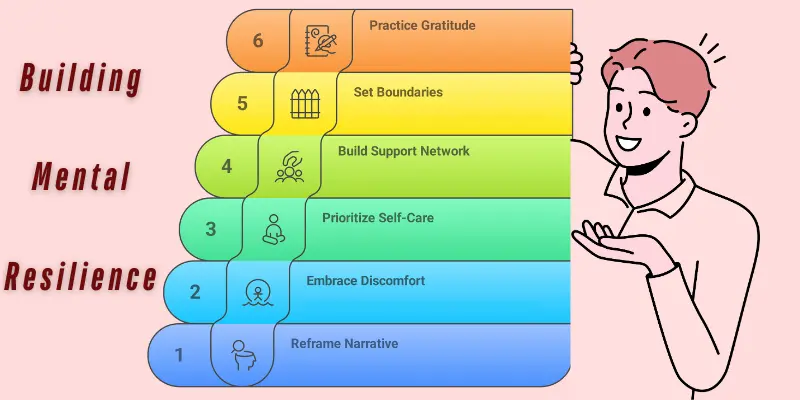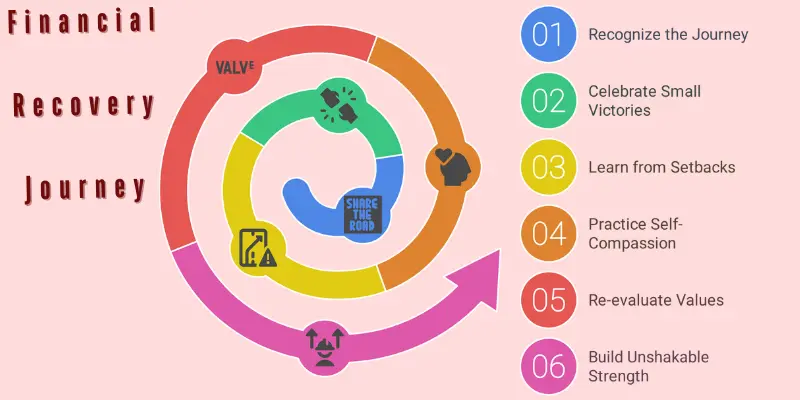How to Stay Mentally Strong When Facing Financial Challenges: Proven Strategies for Tough Times
Published: 22/06/2025
“It’s the gut punch of unexpected bills arriving, the relentless hum of money worries, and the overwhelming shame of debt that feels impossible to escape. If these feelings of stress, anxiety, and helplessness sound all too familiar, you’re not alone.”
Financial challenges are far more than just a numbers game – they are a battle that impacts your mental health in ways we often don’t talk about. It’s the sleepless nights, the strain on relationships, and the ever-present sense of losing control that can weigh you down, making it feel like you’re trapped in an unbreakable cycle.
But here’s the good news: While your financial situation may feel overwhelming, your mental strength is the most powerful asset you have to navigate these tough times. This isn’t just about “coping”; it’s about building unshakable resilience, tapping into inner fortitude, and learning how to face adversity with clarity and control.
In this comprehensive guide, we’ll dive deep into proven strategies to help you cultivate mental toughness, navigate financial challenges with resilience, and reclaim your peace of mind, no matter how tough things get. Whether you’re struggling with debt, unexpected expenses, or just the constant pressure of financial insecurity, this post will show you how to transform these struggles into stepping stones for growth.
And if you’re looking for even more powerful strategies, these principles are rooted in the foundation of unshakable mental toughness, which we explore further in our ultimate guide: [How to Build Unshakable Mental Toughness: The Ultimate Guide for Life’s Toughest Challenges]. This post is your specific roadmap for applying these strategies when money feels like your biggest foe.”
The Mind-Money Connection: Understanding the Psychological Impact
Financial stress doesn’t just weigh on your bank account—it takes a toll on your mental health too. When money is tight or unpredictable, it often feels like everything else in life is equally fragile. Bills pile up, decisions become harder, and your mind races with what-ifs and worst-case scenarios. It’s easy to feel overwhelmed, but what many don’t realize is that financial stress can act like a silent crisis for your mental well-being.
The connection between money and mental health is undeniable. Research shows that chronic financial strain is linked to higher levels of anxiety, depression, and even more serious health issues. It creates a vicious cycle where money problems fuel mental stress, and in turn, mental stress makes it harder to manage financial decisions—leading to even greater struggles.
Financial stress isn’t just about money; it’s about how you perceive and react to the stress it causes. Chronic financial anxiety can lead to emotional distress and, over time, damage mental health, affecting everything from decision-making to relationships.Dr. David Ramsey, Clinical Psychologist and Financial Wellness Expert (Source: Psychology Today)

The Vicious Cycle
When financial worries creep in, they often don’t just affect your wallet; they seep into every part of your life. It’s a cycle that feels almost impossible to break. Financial stress leads to anxiety, which makes it difficult to think clearly, often causing poor decisions about money. This leads to more stress, which can cloud judgment even further, leading to more mistakes and reinforcing the cycle.
This cycle isn’t just about money—it’s about how money stress can make your brain feel like it’s stuck in overdrive. You can’t focus, and decisions become overwhelming. It’s hard to even know where to start, and the constant worry only deepens the sense of powerlessness.
Common Emotional & Mental Tolls
Beyond the obvious signs of stress and anxiety, financial difficulties can bring up deeper, more complex emotional and mental challenges. These are the invisible tolls that many people don’t talk about, but that can be just as damaging as the financial struggles themselves.
- Shame & Guilt
The shame that comes with not meeting financial obligations can be crushing. Shame often turns inward, making you feel like you’ve failed—not just financially, but as a person. It’s the nagging feeling that you should be doing better, that somehow, you should have “figured it out by now.” Guilt follows, especially when you can’t provide for your family or meet your own expectations. But it’s important to know that money issues don’t define you, and feeling guilty doesn’t help fix the situation. - Isolation
When money troubles pile up, it’s easy to pull away from others. You may avoid social events because you can’t afford them, or because you’re embarrassed about your financial situation. This isolation can deepen your sense of shame and make you feel like you’re the only one struggling. But the truth is, financial stress is more common than you might think—and withdrawing from support only makes the struggle harder. Reaching out can make a world of difference. - Decision Paralysis
One of the most common mental tolls of financial stress is decision paralysis. When faced with multiple choices—bill payments, budgeting, prioritizing needs—it can feel like you’re stuck, unable to make any decision at all. This overwhelm can leave you frozen in place, which can worsen the financial situation. The key here is taking small steps, even when you don’t feel ready, to move past the paralysis. - Impact on Self-Worth
When you’re struggling with finances, it’s easy to link your self-worth to your net worth. The negative self-talk often sounds like, “If I can’t manage my money, what does that say about me?” But it’s crucial to remind yourself that money does not define who you are. Your worth is not tied to how much you have in the bank. Financial problems are a tough part of life, but they don’t reflect your value as a person. - Sleep Disturbances & Physical Symptoms
Financial stress also takes a physical toll. Sleepless nights, constant worry, headaches, and stomach issues are all symptoms that the body reacts to stress. The stress of money troubles can even lead to chronic fatigue and burnout. Taking care of your mental health means taking care of your body too—learning to manage stress in healthier ways can improve your sleep and overall well-being.
Normalize the Experience
It’s easy to feel like you’re alone in these struggles, but the truth is, you’re not. Financial challenges affect everyone at some point—and it’s okay to feel the weight of it. The emotions you’re experiencing are normal reactions to tough circumstances, not signs of weakness. Feeling stressed, isolated, or overwhelmed does not make you less capable or less strong. It makes you human.
Many people have been where you are, and they’ve come out the other side. It’s possible to break the cycle of financial stress and build a stronger mental foundation. You are not defined by your financial situation, and seeking help—whether through financial planning, therapy, or support networks—is a sign of strength, not weakness.
Proactive Financial Strategies That Build Mental Strength
When you’re caught in the grip of financial stress, it can feel like everything is spinning out of control. But one of the most empowering ways to combat anxiety is by taking action—any action, no matter how small. Action gives you a sense of agency, allowing you to regain control, even in the midst of overwhelming uncertainty.
It’s easy to feel powerless when financial challenges mount, but when you take even a small step—whether it’s reviewing your budget or negotiating a bill—you begin to create a sense of control. This feeling can reduce the mental load and make the problem feel more manageable. By choosing to act, you’re reminding yourself that you have the power to change the situation.

Let’s dive into specific strategies that help you take that first step, reclaim control, and strengthen your mental resilience.
Confronting Reality with Courage
Action:
The hardest part of financial stress often isn’t the lack of money—it’s the fear of facing what’s in front of you. It’s tempting to avoid looking at bills or checking your bank account balance because it feels like adding more weight to an already heavy burden. But the reality is, avoiding the problem only makes it worse.
Start by setting aside 30 minutes to an hour to go over your bills and statements. Do a complete “financial inventory”—look at everything: income, expenses, debt, savings, and any upcoming financial obligations. Don’t judge yourself in the process; just observe and write down what you see.
Mental Benefit:
Facing the reality of your finances head-on can reduce anxiety that comes from the unknown. The fear of what might be there is often worse than the truth itself. By confronting your situation, you replace fear with clarity. It’s like turning the lights on in a dark room—you can finally see what you’re dealing with and start taking action.
This approach is directly linked to a core principle of mental toughness: courage to confront the tough situations, no matter how difficult. It allows you to regain a sense of control, which is essential for mental strength.
Crafting a “Mental Health First” Budget
Action:
Creating a budget doesn’t have to be overwhelming or restrictive. The goal is to design a budget that works for you—one that respects your mental health as much as your financial health. Start by listing all your fixed expenses (rent, utilities, etc.), followed by your variable expenses (groceries, entertainment, etc.). Next, look at areas where you might be able to cut back, especially on “trigger” spending—those purchases that might feel good in the moment but cause guilt later.
The focus here is to create boundaries. A budget isn’t just about limiting yourself; it’s about creating space to make thoughtful decisions that align with your values and needs. Prioritize the essentials first, and allow yourself the freedom to adjust as needed.
Mental Benefit:
Creating a mental health-first budget helps reduce the feeling of being overwhelmed. It’s a structured way to manage your resources, which can decrease the anxiety of feeling like you have no control over your spending. It also prevents impulsive, guilt-inducing purchases that can add to the mental stress. Setting boundaries gives you a sense of peace and control, allowing you to manage your financial situation without compromising your well-being.
This also connects to mental toughness by reinforcing your ability to set limits and prioritize what matters most, rather than being at the mercy of circumstances.
Setting Small, Achievable Financial “Wins”
Action:
Sometimes, the road to financial recovery feels long and uncertain. One way to combat feelings of helplessness is by setting small, achievable financial goals. Whether it’s paying off a small debt or saving $50 for an emergency fund, start with something manageable.
Begin with something small that you can achieve in the short term. Pay off a credit card balance or save a small amount for a rainy day. Every step you take counts, and by focusing on small wins, you’ll build momentum.
Mental Benefit:
Achieving small financial goals boosts your confidence and provides positive reinforcement. This makes it easier to keep going, because you see tangible progress. Small wins combat feelings of helplessness and give you something to celebrate. In turn, this feeds into mental toughness by reinforcing the idea that challenges can be overcome, one step at a time.
It’s also a reminder that progress is progress, no matter how small. It strengthens your resilience and helps you approach bigger challenges with the same mindset.
Seeking Professional Financial Guidance (A Sign of Strength)
Action:
If you’re feeling stuck or overwhelmed, reaching out for help can be one of the most empowering things you can do. Contacting a credit counselor, financial planner, or using debt management services might feel intimidating, but it’s an incredibly strong step toward taking control of your situation.
Many services are available on a sliding scale or even free of charge. There’s no shame in asking for expert advice—it’s an act of strength, not weakness.
Mental Benefit:
Seeking professional guidance allows you to offload the burden of trying to solve everything on your own. It gives you a fresh perspective and practical steps to move forward. It also removes the shame that often accompanies financial struggles. You no longer have to carry the weight of not knowing what to do. Instead, you’re actively taking steps to improve your situation, showcasing mental resilience in action.
By reaching out for support, you’re demonstrating the mental toughness to ask for help when you need it—and that is a sign of strength.
Conclusion of the Section
Taking control of your financial situation, no matter how small the step, can create a profound shift in your mental and emotional well-being. Each of these strategies helps you regain a sense of control, reduce anxiety, and build momentum toward greater resilience. As you take action—whether it’s facing your finances head-on, setting a thoughtful budget, celebrating small wins, or seeking professional help—you’re not only improving your finances but strengthening your mental toughness to weather any storm that comes your way.
Cultivating Inner Resilience: Direct Mental & Emotional Strategies
In the face of financial struggles, it’s common to feel as though you’re merely coping—getting by day to day, managing just enough to survive. But to truly build mental resilience, you need to go beyond just getting through. It’s about actively developing mental toughness—the inner strength to face any challenge head-on, and to turn obstacles into opportunities for growth.

In this section, we’ll explore practical strategies that help you build inner toughness and resilience, turning every financial challenge into a stepping stone toward a stronger you.
Reframe the Narrative: From Victim to Victor
Strategy:
Your thoughts and the stories you tell yourself are incredibly powerful. Often, when financial stress hits, it’s easy to fall into a victim mindset. You may find yourself thinking, “I’m a failure,” “It’s hopeless,” or “I’ll never get ahead.” These thoughts only reinforce feelings of helplessness and make the situation feel even worse. But mental strength begins with changing the narrative.
Instead of seeing yourself as a victim of circumstances, try reframing your thoughts. Challenge those negative beliefs with more empowering ones. Ask yourself, “What can I learn from this?”, “What resources do I have to find a solution?”, or “How can I grow stronger from this experience?”
Mental Toughness Link:
This practice directly relates to mastering self-talk and perspective—core principles of mental toughness. By shifting your focus from helplessness to growth, you’re building resilience. Here’s a practical example:
- Old Thought: “I can’t handle this. I’m terrible with money.”
- Reframed Thought: “This is tough, but I’m learning how to make better decisions. I’m gaining new skills every day.”
This reframing technique transforms a setback into an opportunity for growth, strengthening your mental toughness.
True mental resilience is about confronting discomfort and uncertainty, not avoiding it. When you take small, proactive steps in managing your finances, you’re not just improving your financial situation; you’re strengthening your mind for future challenges.Dr. Kelly Richards, Psychologist and Author of Resilience in the Face of Financial Crisis (Source: Harvard Health Publishing)
Embrace Discomfort & Uncertainty (Mindfulness for Money)
Strategy:
Financial stress often brings up a lot of anxiety, particularly when thinking about future uncertainties or mistakes from the past. Instead of letting these thoughts spiral out of control, mindfulness can help you stay anchored in the present moment. When anxiety hits, take a few minutes to breathe deeply and focus on what’s in front of you right now—not the “what-ifs” of the future or regrets from the past.
One simple exercise is the 5-4-3-2-1 grounding technique:
- 5 things you can see
- 4 things you can feel
- 3 things you can hear
- 2 things you can smell
- 1 thing you can taste
This practice pulls you back to the present and helps you release the tension of worrying about things you can’t control.
Mental Toughness Link:
Mindfulness helps you tolerate discomfort and manage emotional responses—key components of mental toughness. Rather than letting anxiety paralyze you, mindfulness teaches you to stay calm and clear-headed, which in turn helps you make better decisions, even in stressful times.
Non-Negotiable Self-Care (Not a Luxury)
Strategy:
When financial stress takes over, it’s easy to neglect yourself—skipping meals, losing sleep, or abandoning your usual routines. However, neglecting your physical and mental health can quickly weaken your resilience. Mental strength is built on a solid foundation of physical well-being. Prioritize sleep, eat well, and find ways to move your body—even simple activities like taking a walk can make a big difference.
Focus on free or low-cost activities that support your well-being, such as:
- Walking or jogging
- Yoga or stretching at home
- Meditation or breathing exercises
- Engaging in hobbies that bring you joy (even if they’re simple, like reading or journaling)
Mental Toughness Link:
Physical health directly supports mental stamina. When you take care of your body, you equip yourself with the energy and focus needed to tackle life’s challenges. Skipping self-care erodes resilience, leaving you more vulnerable to stress. This self-care isn’t a luxury—it’s a critical part of mental toughness.
Build Your Mental Support Squad (and Know When to Lean In)
Strategy:
No one is meant to go through tough times alone. One of the most empowering things you can do is build a support network—people who can offer advice, empathy, or just a listening ear. Don’t be afraid to lean on trusted friends or family members during difficult times. You don’t have to carry the weight of your financial stress in isolation.
If personal support is limited, consider joining online or in-person support groups for people facing financial challenges. You’re not alone in this—there are others who understand what you’re going through and can offer support.
Mental Toughness Link:
This connects to vulnerability—a key trait of mental resilience. Admitting that you need help is not a sign of weakness, but a sign of strength. Knowing when to reach out for support builds emotional endurance, reinforcing your mental toughness.
Set Boundaries: Protecting Your Mental Energy
Strategy:
Financial stress can often come from external pressures: debt collectors, judgment from others, or even your own constant worrying. Part of mental strength is setting clear boundaries to protect your mental energy. This includes:
- Knowing your rights when dealing with debt collectors.
- Setting boundaries with people who make you feel judged or stressed about your financial situation.
- Limiting your “worry time” by setting a specific time of day (e.g., 15 minutes) to reflect on your worries, and then consciously letting them go for the rest of the day.
Mental Toughness Link:
Setting boundaries is a self-preservation tactic, which is key to maintaining mental resilience. By protecting your mental space and energy, you ensure that you have the strength to focus on what truly matters—your well-being, your goals, and your resilience.
The Power of Gratitude, Even in Scarcity
Strategy:
In tough financial times, it’s easy to focus on what’s missing. But practicing gratitude—even for the small things—can shift your mindset and provide a boost of emotional well-being. Each day, take a moment to reflect on what you do have, whether it’s your health, your ability to pay for necessities, or simply the fact that you’re still moving forward despite challenges.
A simple practice is to write down three things you’re grateful for each day, no matter how small they may seem.
Mental Toughness Link:
Gratitude helps shift focus away from scarcity and lack, fostering optimism. It helps you reframe your challenges by focusing on what you can control and what you have to be thankful for, no matter how hard things may seem. This shift in mindset strengthens your emotional well-being and contributes to mental toughness.
Conclusion of the Section
Building mental resilience isn’t just about enduring tough times; it’s about actively applying strategies that strengthen your mind and emotions. The steps you take to build your mental toughness—whether it’s reframing negative thoughts, practicing mindfulness, or setting boundaries—are all crucial parts of navigating financial challenges with resilience. By prioritizing your mental health and taking proactive steps, you not only improve your financial situation but also become stronger and more capable of handling life’s toughest challenges.
Sustaining Strength Through the Long Haul: Beyond the Crisis
Recovering from financial stress isn’t something that happens overnight. It’s a long journey, one that requires ongoing effort, patience, and a steady commitment to mental resilience. Just like any marathon, the path to financial recovery may feel tough at times. There will be ups and downs, progress and setbacks. But mental strength is what keeps you going, even when the road seems endless.
When facing financial hardship, it’s easy to get frustrated with how slow the progress feels. But true strength lies in persistence—in continuing to put one foot in front of the other, even when you don’t see immediate results. Remember: small, steady steps toward financial recovery will add up over time. It’s not about perfection; it’s about staying the course and remaining mentally strong, even when things don’t improve as quickly as you’d like.

Celebrate Small Victories
In the midst of a financial crisis, it’s easy to focus on what’s still wrong, rather than what’s going right. But every small victory—whether it’s sticking to a budget, making a payment on time, or simply feeling a little less stressed—is worth celebrating.
Action Tip: Set a weekly or monthly reminder to reflect on your achievements, no matter how small. It could be paying off a small portion of debt, saving a little extra money, or even just staying calm during a stressful situation.
Benefit:
Acknowledging these victories helps to build momentum and boost your confidence. Each step forward, no matter how minor it seems, is a reminder that you are making progress. Celebrating these small wins keeps your spirits high and reinforces the belief that recovery is possible.
This focus on small wins directly ties to mental toughness, where each small accomplishment boosts your resilience and provides the motivation to keep going.
Learn from Setbacks
It’s important to remember that setbacks are part of the journey—they don’t define you. When you make mistakes or encounter obstacles, instead of seeing them as failures, view them as learning opportunities. Every mistake, every bump in the road, offers valuable lessons.
Strategy: When you face a setback, ask yourself:
- What can I learn from this?
- How can I adjust my approach next time?
- What worked in the past, and how can I use that experience to move forward?
Benefit:
Learning from setbacks prevents you from getting discouraged. It’s important to view financial challenges not as an end but as a step in the process. This mindset shift fosters mental resilience, helping you stay focused on your long-term goals instead of getting caught up in temporary difficulties.
Practice Self-Compassion
When finances are tight, it’s easy to be harsh on yourself. You may feel a deep sense of self-blame or frustration, thinking that you should be doing better or have everything figured out by now. But self-compassion is key to maintaining mental strength throughout your recovery.
Strategy: Instead of being critical of yourself, practice kindness. Talk to yourself the way you would talk to a friend who is going through a tough time. Remind yourself that it’s okay to not have all the answers, and that mistakes don’t define your worth. Financial struggles often carry a heavy emotional burden, and being kind to yourself helps to reduce the mental load.
Benefit:
Self-compassion is essential for long-term mental resilience. It prevents burnout, helps you recover emotionally, and reinforces the belief that you deserve peace and well-being. Mental strength doesn’t come from being perfect—it comes from being kind to yourself during the tough moments.
Re-evaluating Values
Financial stress often forces you to face what truly matters in life. It strips away the distractions, revealing what is essential and what is simply noise. This is a unique opportunity to reassess your values and what you want to prioritize moving forward.
Action Tip: Take time to reflect on what you value most in life. Is it financial security, personal growth, relationships, or something else? Consider how your financial journey can align with these values. What adjustments can you make to honor your priorities beyond material wealth?
Benefit:
Re-evaluating your values can provide a sense of purpose and clarity, making it easier to make decisions that align with your true goals. It also frees you from the pressure of chasing material success at the cost of personal fulfillment. When you focus on what truly matters, it strengthens your emotional and mental resilience, helping you stay grounded during financial challenges.
Conclusion: The Marathon of Mental Strength
Financial recovery isn’t an overnight fix. It’s a marathon, one that demands patience, persistence, and mental toughness. Along the way, remember to celebrate every small victory, learn from your setbacks, and be kind to yourself. Keep re-evaluating what truly matters and align your actions with your core values. The journey may be long, but with each step, you’re building unshakable strength—strength that will carry you through not just this financial challenge, but all of life’s toughest moments.
When to Seek Professional Mental Health Support
Financial stress can affect your mental well-being in profound ways. It’s natural to feel overwhelmed during tough times, but there are signs that your emotional or mental state might need professional attention. If you’re experiencing any of the following, it may be time to reach out for help:
- Persistent Despair: If you’re feeling hopeless for an extended period of time, unable to imagine things getting better, it’s a sign that your mental health may be taking a deeper hit.
- Severe Anxiety: While occasional stress and worry are normal, severe anxiety—constant, uncontrollable worry or panic attacks—can be debilitating and interfere with your ability to function.
- Suicidal Thoughts: If you’re thinking about harming yourself or considering suicide, it’s critical to seek professional help immediately. These thoughts are a serious sign that your mental health needs urgent attention.
- Inability to Function: If you find it hard to get out of bed, go to work, or manage day-to-day responsibilities because of mental or emotional strain, it could be a sign that you’re overwhelmed to the point of burnout.
- Relationship Breakdown Due to Stress: Financial stress often strains relationships—whether with a partner, family, or friends. If your stress is creating constant conflict or pushing people away, professional guidance can help you manage emotions and improve communication.
Seeking professional advice is not a sign of weakness; it’s a strategic move toward mental and financial strength. Whether it’s financial counseling or therapy, seeking help can offload the burden and give you the tools to regain control over your finances and your mind. Elizabeth Turner, Certified Financial Planner & Mental Health Advocate (Source: The Financial Planning Association)
These red flags are not signs of weakness or failure—they’re signs that your mind and body need support to heal. If any of these signs resonate with you, it’s important to recognize that asking for help is a sign of strength, not a weakness.
Normalize Seeking Help
For many people, the thought of seeking professional help can feel daunting or even shameful. Society sometimes perpetuates the idea that you should “tough it out” or “handle your problems on your own,” but this couldn’t be further from the truth. Reaching out for help is one of the strongest things you can do for your mental health.
Just as you would seek a doctor for a physical injury, seeing a therapist or counselor when you’re struggling emotionally or mentally is just as important. Mental health professionals are trained to help you navigate tough times, find coping mechanisms, and improve your overall well-being.
Taking the step to seek help is not a sign of failure—it’s an act of resilience. It shows that you care enough about your mental health to get the support you need to get through difficult times. Remember, you don’t have to face these challenges alone, and professional support can make a huge difference in building long-term resilience.
Resources
If you’re considering seeking help but aren’t sure where to turn, there are plenty of resources available. You don’t need to figure this out on your own. Here are a few places to get started:
- Local Mental Health Services: Many communities offer public mental health services, including counseling and therapy on a sliding scale based on income. Search for local clinics or nonprofits that provide affordable care.
- Helplines: If you’re in immediate distress, helplines are available for confidential support. Many national and local hotlines offer free and anonymous support, no matter your situation.
- Online Therapy Platforms: There are several online platforms like BetterHelp or Talkspace that offer virtual therapy sessions, which can be a convenient and private way to seek help, especially if you’re feeling overwhelmed.
Taking that first step toward seeking professional help can feel intimidating, but it’s also a huge step toward healing and strength. The right professional support can provide you with the tools to manage stress, overcome emotional hurdles, and restore your mental well-being.
Conclusion: Your Mental Strength is Worth Protecting
Recognizing when to seek help is a crucial part of maintaining your mental strength. Remember, struggling with financial stress doesn’t make you weak—it makes you human. Seeking professional help isn’t a sign of defeat; it’s an important and proactive step in reclaiming your emotional and mental well-being.
Whether you’re facing overwhelming anxiety, feeling stuck in a cycle of despair, or just need someone to talk to, help is available. Taking that step is an act of strength, and it can make a profound difference in your ability to navigate financial struggles and come out stronger on the other side.
Conclusion: Your Unshakable Strength in Challenging Times
While financial challenges can feel overwhelming and unrelenting, it’s important to remember that your mental strength is your greatest asset. The pressure may seem constant, but your ability to adapt, grow, and persevere is something you can cultivate. Mental toughness isn’t a trait you’re born with—it’s a skill you can develop, just like any other.
Throughout this journey, you’ve learned strategies to help you build resilience and stay grounded during tough times. Whether it’s reframing your thoughts, seeking support, or simply taking small, proactive steps every day, you have the power to navigate these storms.
The path may be long, but your mental strength will carry you through. Every challenge is an opportunity to strengthen your resolve and grow stronger. Remember, it’s not about avoiding hardships—it’s about learning how to thrive through them.
Remember, building unshakable mental toughness isn’t just for financial challenges. It’s a foundation for all of life’s obstacles—from personal struggles to professional setbacks, this resilience will guide you through it all.
To deepen your understanding and apply these principles across every facet of your life, explore our definitive guide: [How to Build Unshakable Mental Toughness: The Ultimate Guide for Life’s Toughest Challenges].
You are stronger than you think, and you have the tools to overcome whatever life throws your way.
As you move forward, know this: resilience is built one small step at a time, and every effort counts. You are capable of overcoming these financial challenges—and anything else that comes your way. Life’s storms might shake you, but your mental strength will keep you standing tall. You’ve got this. Keep building, keep growing, and remember—you are stronger than you ever imagined.
Your Top Questions on Mental Strength & Money Stress Answered
Financial stress can lead to a range of mental health issues, from anxiety and chronic worry to feelings of shame, helplessness, and depression. It can disrupt sleep, increase irritability, and strain relationships, creating a cycle that’s tough to break without a strong mindset.
The first mental step is to confront the reality without judgment. It’s easy to avoid, but facing the situation directly, however uncomfortable, replaces vague fear with concrete information. This act of acknowledging creates a sense of control and is a foundation for mental toughness.
Yes, definitely! Creating a budget, even a simple one, significantly boosts your mental strength by giving you a sense of control and agency. It replaces uncertainty with clarity and empowers you to make intentional decisions, reducing anxiety and financial paralysis.
You should seek professional help if financial stress leads to persistent feelings of hopelessness, severe anxiety, panic attacks, thoughts of self-harm, chronic sleep problems, or significant relationship breakdowns. Reaching out to a therapist or financial counselor is a sign of mental strength, not weakness.
Maintaining a positive outlook involves active reframing and gratitude. Challenge negative thoughts by consciously focusing on what you can control and the small steps you are taking. Even in tough times, practicing gratitude for non-financial aspects of your life can significantly shift your mental state.
Absolutely! Mental toughness applies directly to money problems. Principles like embracing discomfort, setting boundaries, managing emotions, and maintaining self-care are all crucial for navigating financial challenges. It’s about building the inner fortitude to stay resilient, even when your financial world feels shaky.
The anxiety comes from the unknown. Instead of constant checking, schedule specific, limited times (e.g., once a day, or every other day) to review your finances. Outside these times, practice mindfulness or distraction techniques to reduce rumination.
Financial stress often leads to sleepless nights. Try creating a “worry list” before bed, writing down all concerns to get them out of your head. Practice relaxation techniques, ensure a dark, cool room, and avoid screens an hour before sleep.
Open and honest communication is key. Choose a calm time, express your feelings using “I” statements (“I feel worried about…” instead of “You make me worried…”). Focus on finding solutions together rather than blaming, and discuss your shared goals.
Many stress-reducing activities are free. Try deep breathing exercises, going for a walk in nature, listening to free podcasts, connecting with loved ones (virtually or in person), reading a book from the library, or meditating with free apps.

- Be Respectful
- Stay Relevant
- Stay Positive
- True Feedback
- Encourage Discussion
- Avoid Spamming
- No Fake News
- Don't Copy-Paste
- No Personal Attacks

- Be Respectful
- Stay Relevant
- Stay Positive
- True Feedback
- Encourage Discussion
- Avoid Spamming
- No Fake News
- Don't Copy-Paste
- No Personal Attacks





